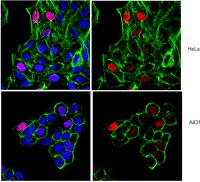Prdm16 is required for the maintenance of brown adipocyte identity and function in adult mice.
Harms, MJ; Ishibashi, J; Wang, W; Lim, HW; Goyama, S; Sato, T; Kurokawa, M; Won, KJ; Seale, P
Cell metabolism
19
593-604
2014
Afficher le résumé
Prdm16 is a transcription factor that regulates the thermogenic gene program in brown and beige adipocytes. However, whether Prdm16 is required for the development or physiological function of brown adipose tissue (BAT) in vivo has been unclear. By analyzing mice that selectively lacked Prdm16 in the brown adipose lineage, we found that Prdm16 was dispensable for embryonic BAT development. However, Prdm16 was required in young mice to suppress the expression of white-fat-selective genes in BAT through recruitment of the histone methyltransferase Ehmt1. Additionally, Prdm16 deficiency caused a severe adult-onset decline in the thermogenic character of interscapular BAT. This resulted in BAT dysfunction and cold sensitivity but did not predispose the animals to obesity. Interestingly, the loss of brown fat identity due to ablation of Prdm16 was accelerated by concurrent deletion of the closely related Prdm3 gene. Together, these results show that Prdm16 and Prdm3 control postnatal BAT identity and function. | 24703692
 |
The histone H3 methyltransferase G9A epigenetically activates the serine-glycine synthesis pathway to sustain cancer cell survival and proliferation.
Ding, J; Li, T; Wang, X; Zhao, E; Choi, JH; Yang, L; Zha, Y; Dong, Z; Huang, S; Asara, JM; Cui, H; Ding, HF
Cell metabolism
18
896-907
2013
Afficher le résumé
Increased activation of the serine-glycine biosynthetic pathway is an integral part of cancer metabolism that drives macromolecule synthesis needed for cell proliferation. Whether this pathway is under epigenetic control is unknown. Here we show that the histone H3 lysine 9 (H3K9) methyltransferase G9A is required for maintaining the pathway enzyme genes in an active state marked by H3K9 monomethylation and for the transcriptional activation of this pathway in response to serine deprivation. G9A inactivation depletes serine and its downstream metabolites, triggering cell death with autophagy in cancer cell lines of different tissue origins. Higher G9A expression, which is observed in various cancers and is associated with greater mortality in cancer patients, increases serine production and enhances the proliferation and tumorigenicity of cancer cells. These findings identify a G9A-dependent epigenetic program in the control of cancer metabolism, providing a rationale for G9A inhibition as a therapeutic strategy for cancer. | 24315373
 |











